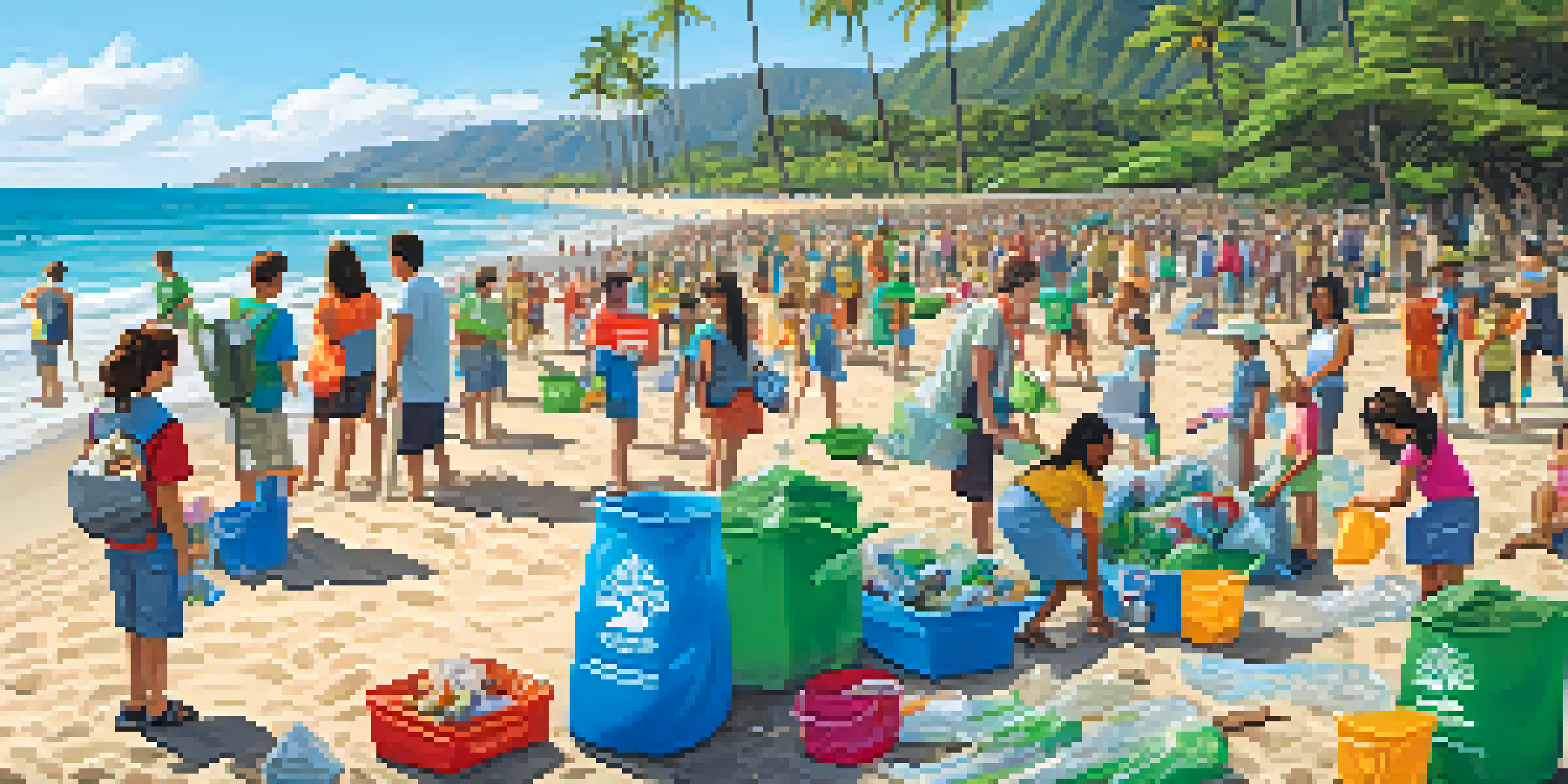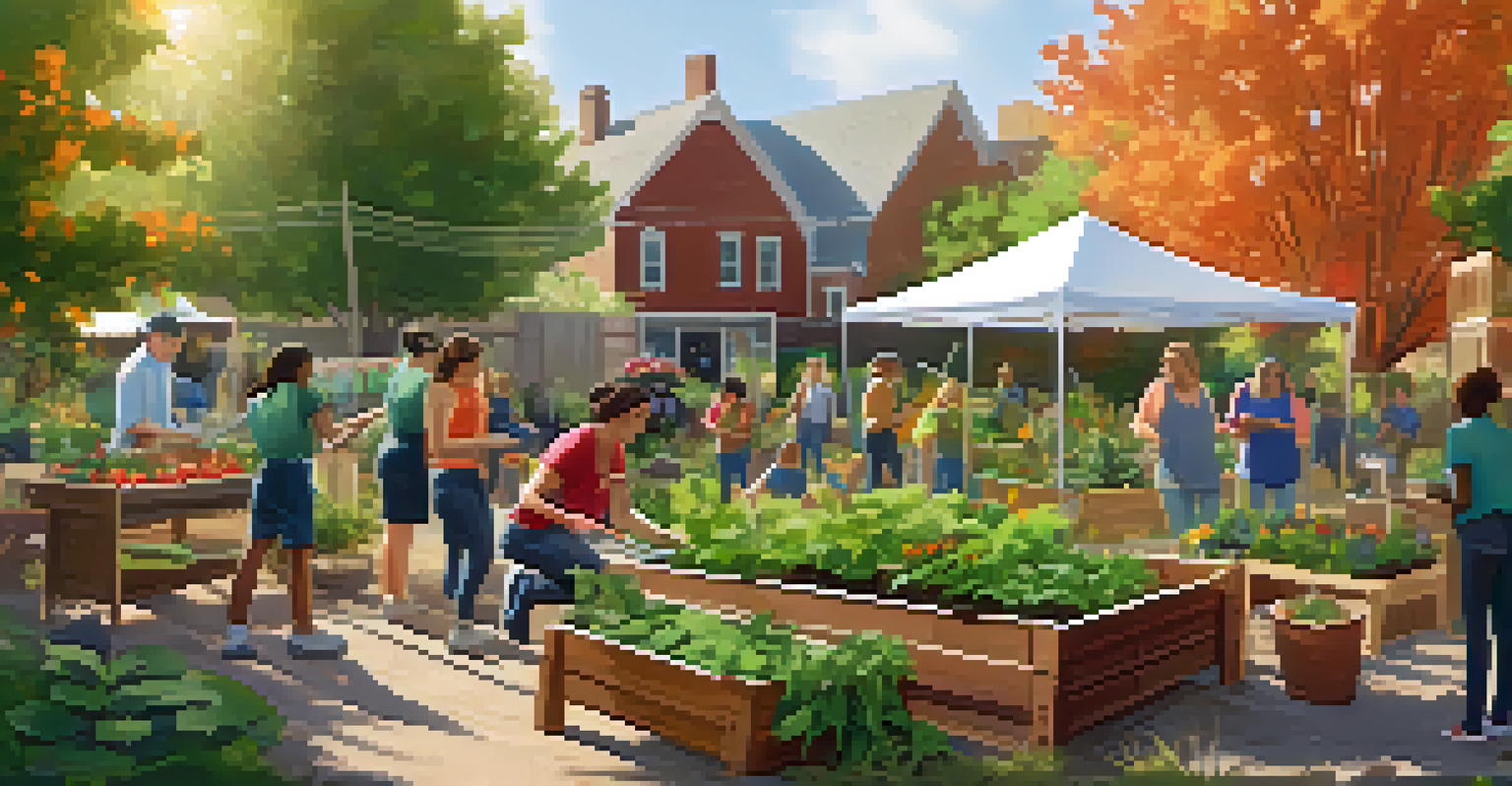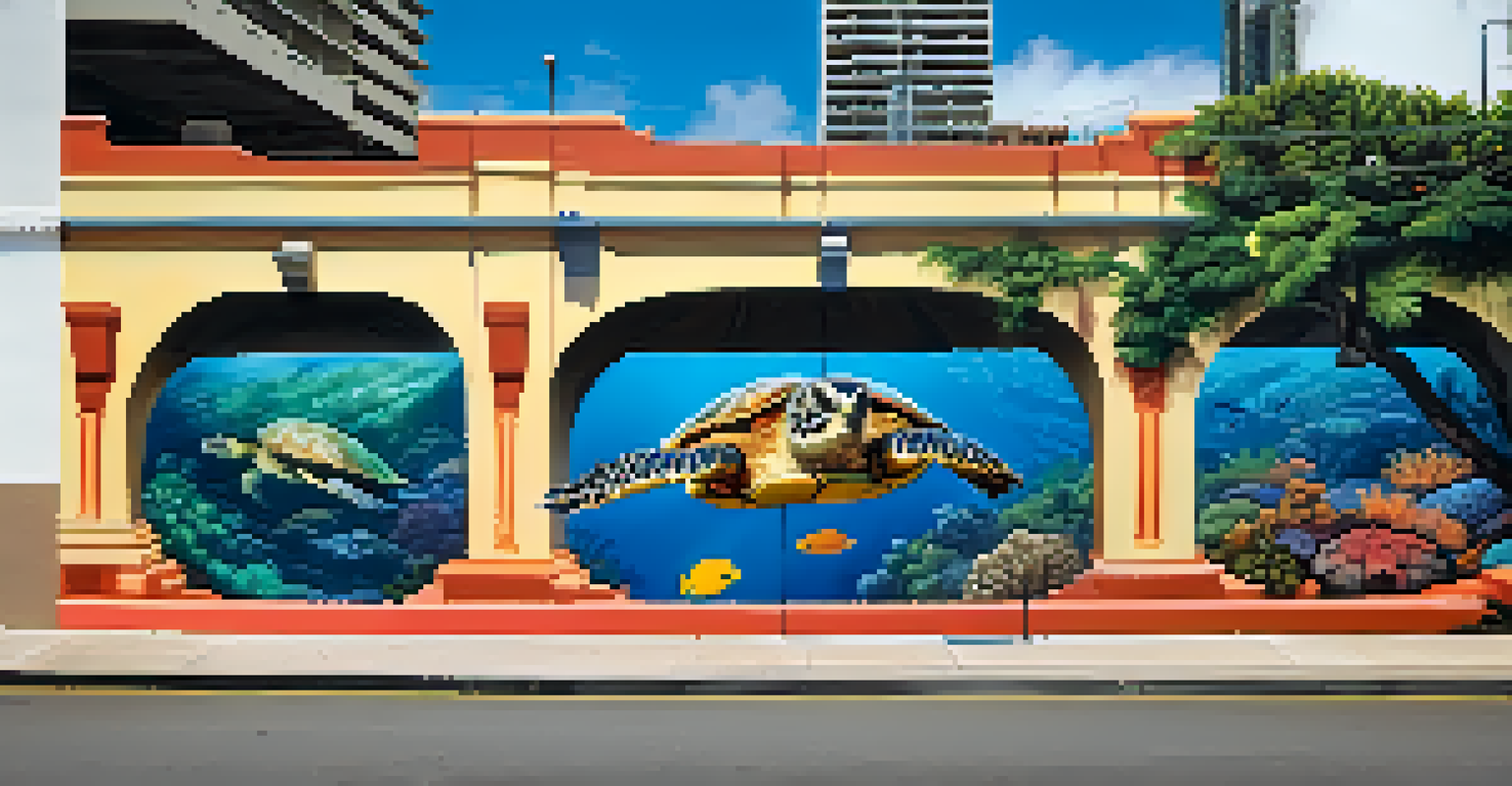Innovative Programs for Environmental Awareness in Honolulu

Community Clean-Up Initiatives Engage Local Residents
Honolulu has seen a surge in community clean-up initiatives that bring residents together. These events not only beautify the island but also foster a sense of pride and responsibility towards the environment. When locals participate in cleaning beaches or parks, they develop a deeper understanding of the impact of littering and pollution.
The best way to find yourself is to lose yourself in the service of others.
These clean-up events often include educational components, where participants learn about local ecosystems and the importance of preserving them. For example, volunteers might discover how certain waste affects marine life, sparking conversations about sustainability. Such hands-on experiences can be eye-opening, turning casual participants into passionate environmental advocates.
Moreover, these initiatives create a ripple effect, encouraging others to join the movement. Friends and families who participate together often share their experiences on social media, inspiring a broader audience to take action. As the community bonds over these events, the message of environmental conservation spreads far and wide.
School Programs Promote Environmental Education
Honolulu's schools are implementing innovative programs that focus on environmental education, helping students connect with nature. Through hands-on projects, like garden installations and recycling initiatives, students learn the value of sustainability from a young age. This practical approach not only makes learning fun but also instills a lasting respect for the environment.

One standout example is the ‘Green School’ initiative, where students engage in activities such as composting and energy conservation. These programs empower kids to take ownership of their environmental footprint and make eco-friendly choices. By incorporating sustainability into the curriculum, schools are nurturing the next generation of environmental stewards.
Community Engagement Drives Change
Honolulu's community clean-up initiatives and educational programs foster a sense of responsibility and pride among residents towards environmental conservation.
Furthermore, partnerships with local organizations enhance these educational efforts. Guest speakers from environmental groups often visit schools, sharing real-world experiences and challenges. This collaboration not only enriches students’ learning but also creates a community of young advocates passionate about protecting their island home.
Innovative Workshops Foster Sustainable Practices
Workshops focusing on sustainable living have become increasingly popular in Honolulu. These sessions cover a range of topics, from composting and urban gardening to water conservation techniques. Participants leave with practical skills they can implement in their daily lives, making sustainability accessible and achievable.
We won't have a society if we destroy the environment.
For instance, a recent workshop on creating zero-waste homes attracted numerous attendees eager to reduce their environmental impact. Participants learned about recycling, repurposing items, and making eco-friendly household products. By providing tangible solutions, these workshops empower individuals to make informed decisions that benefit both their households and the environment.
Moreover, these gatherings often foster a sense of community among participants. Attendees share their personal experiences, tips, and challenges, creating a supportive network. This exchange of ideas not only enhances individual knowledge but also encourages collective action towards environmental sustainability in Honolulu.
Local Art Projects Highlight Environmental Issues
Art has a unique power to inspire change, and Honolulu is harnessing this through local art projects that address environmental issues. These projects often feature installations made from recycled materials, drawing attention to the importance of reducing waste. Artists use their platforms to convey messages about sustainability, engaging the public in meaningful discussions.
One notable project involved murals depicting the beauty of Hawaii’s marine life, juxtaposed with the threats they face from pollution. Such visual narratives captivate audiences and provoke emotional responses, prompting them to consider their role in protecting the environment. Art becomes not just a medium of expression but a call to action for the community.
Art and Workshops Inspire Action
Local art projects and hands-on workshops promote sustainability while encouraging community involvement and awareness of environmental issues.
Additionally, these art initiatives often collaborate with environmental organizations, creating a powerful blend of creativity and activism. Events like art walks or exhibitions educate attendees on local conservation efforts, reinforcing the idea that everyone can contribute to a healthier planet. By intertwining art and environmental awareness, Honolulu is fostering a culture of creativity that champions sustainability.
Beach Education Programs Teach Conservation
Honolulu's beach education programs are vital for raising awareness about coastal conservation. These initiatives often involve guided tours that educate participants on the local marine ecosystem and the challenges it faces. By immersing individuals in the beauty of their surroundings, these programs inspire a sense of stewardship for the beaches.
For example, participants might learn about the importance of coral reefs and the detrimental effects of pollution and climate change. Hands-on activities, like snorkeling or tide pool exploration, allow attendees to experience marine life up close, deepening their connection to the ocean. This experiential learning makes the information resonate more, encouraging participants to take action.
Additionally, these programs often encourage responsible beach practices, such as proper waste disposal and respecting wildlife habitats. By instilling these values, participants leave with a better understanding of how their actions impact the environment. This knowledge empowers them to advocate for conservation and share their insights with friends and family.
Community Gardens Enhance Local Biodiversity
Community gardens are blossoming throughout Honolulu, serving as both green spaces and educational hubs for environmental awareness. These gardens allow residents to grow their own food while learning about biodiversity and sustainable practices. As people come together to cultivate plants, they also cultivate a sense of community and connection to nature.
Through workshops and events, community gardens educate participants about native plants and their ecological significance. Residents gain insights into how to support local wildlife and pollinators, creating habitats that foster biodiversity. This hands-on experience not only benefits the environment but also strengthens community bonds.
Business Collaborations Enhance Impact
Partnerships between local businesses and environmental organizations are crucial in promoting sustainable practices and raising awareness within the community.
Moreover, community gardens often collaborate with schools and local organizations, amplifying their reach and impact. By involving a diverse group of participants, these gardens promote inclusivity and shared responsibility for local ecosystems. The result is a vibrant community that values sustainability and actively works towards preserving their environment.
Engaging Social Media Campaigns Raise Awareness
In today's digital age, social media campaigns are proving to be powerful tools for environmental awareness in Honolulu. Local organizations are leveraging platforms like Instagram and Facebook to share inspiring stories, tips, and calls to action. These campaigns not only reach a wider audience but also foster a sense of community around environmental issues.
For instance, campaigns encouraging residents to reduce plastic use or participate in local clean-ups often go viral, generating significant engagement. By using relatable content, such as memes or personal stories, organizations connect with audiences on a deeper level. This approach makes environmental issues feel more accessible and less daunting.

Furthermore, social media allows for real-time updates on local events and initiatives, keeping the community informed and involved. The interactive nature of these platforms encourages dialogue and feedback, enhancing the overall effectiveness of campaigns. As more people engage with these messages, the collective impact on environmental awareness continues to grow.
Collaboration with Local Businesses Supports Sustainability
Local businesses in Honolulu are increasingly recognizing their role in promoting environmental awareness through collaborative efforts. Partnerships between businesses and environmental organizations are creating programs that benefit both the community and the planet. By aligning their goals, these entities can amplify their impact and reach.
For instance, some restaurants have started implementing waste-reduction strategies, such as composting and sourcing ingredients locally. This not only minimizes their carbon footprint but also educates patrons about the importance of sustainable practices. When customers see their favorite establishments taking action, they are more likely to adopt similar habits.
Additionally, businesses often sponsor community events or educational workshops, demonstrating their commitment to environmental stewardship. This collaboration creates a win-win situation, where the business enhances its reputation while supporting local conservation efforts. As these partnerships flourish, they contribute significantly to the overall environmental awareness in Honolulu.